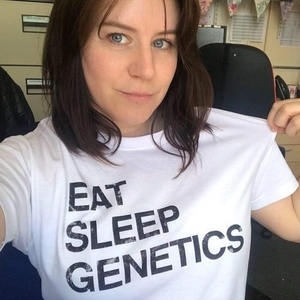How long have you worked at RB&HH? 
Since 2004, first on the wards, then in research and now in the inherited cardiac condition (ICC) team – this is where I will stay. It’s my calling.
What are inherited cardiac conditions?
Inherited conditions and genomic healthcare is seen as a very specialist area because of its complexity, and rightly so, but understanding the part genetics plays within individualised care and treatment can be extremely effective, and in some cases, lifesaving. Genetics or genomics (the study of all the DNA of one person) can be used to help with diagnoses in people of all ages. It can identify inherited conditions, people’s risk of illness and support family planning, but it can also reassure people that they are not at risk. It can also help prevent serious illness and even sudden cardiac death in young people.
There are approximately 50 currently known inherited cardiac conditions. These include cardiomyopathies (heart muscle conditions), arrythmias (abnormal heart rhythms) and aortopathies (diseases of the aorta, the large blood vessel that carries blood from the heart to the rest of the body).
Can you describe what you do day-to-day?
I work as part of a large and diverse department that includes paediatric and adult trained nurse specialists, paediatric and adult cardiologists, cardiothoracic (heart, lungs and chest) surgeons, genetic counsellors, clinical psychologists, geneticists and genetic scientists. We help families that are affected by, or at risk of, ICCs and I help manage a team of nurses within the department. The type of help we offer patients will vary on the age of the person, their condition, where they are in their journey with an ICC, and other factors that may be affecting them, such as school, pregnancy, or other conditions.
As an ICC Nurse specialist, my days vary hugely. One day I will be supporting consultants during their clinic, the next I could be carrying out consultations for patients in the specialist-nurse clinic. I’m also often on the phone answering calls from patients, GPs, other nurses and doctors and advising family members on the need for family screening or reassuring other families that it is not necessary.
When I’m not busy with our patients, I provide teaching to staff in and outside the hospital – I also have to make time for my own learning of course! In view of my team’s specialism and experience in the area, we are often asked to give talks, both nationally and internationally, regarding the care we offer. We believe collaboration is key to excellent care, so we are involved in several projects with our partners at Guy's and St Thomas' hospitals, King’s College Hospital and Evelina London Children's Hospital.
There is no other ICC nursing team like this in the UK that supports family-centred care in this way.
What do you like most about your job?
The privilege of working so closely and getting to know such incredible people and families – their resilience blows me away daily. My team too. I’m the luckiest person in the hospital.
Which part of your job is most challenging?
The hardest part is the same as most nurses – getting to know someone so well, but then them passing away. Thankfully this is very rare.
Why did you decide to work in healthcare?
Easy, my mum! She was the most sensational, compassionate, clever and forward-thinking nurse I have ever met – I wanted to be just like her. I’m still working on it.
#GenomicsConversation
